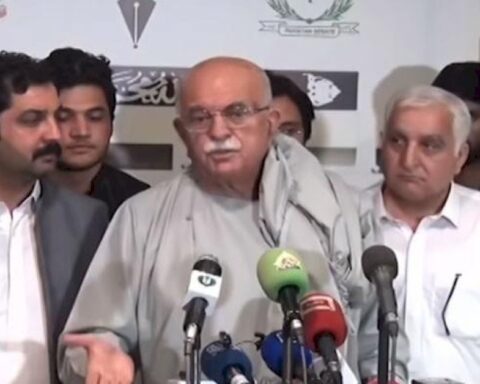The ruling party in Pakistan, the Pakistan Muslim League-Nawaz (PTI“>PML-N), has opposed talks with their political rivals, the Pakistan Tehreek-e-Insaf (PTI). Planning Minister Ahsan Iqbal stated that any dialogue with the PTI would only be possible if they apologised for allegedly staging violent protests on May 9 last year. The Defence Minister Khawaja Asif also opposed talks with the former ruling party. Despite several attempts by the PML-N to extend an olive branch to Imran Khan’s party, he has refused to hold talks unless those who wield real power in the country are involved.
Reports suggest that PML-N had approached Pashtunkhwa Milli Awami Party (PkMAP) Chairman Mehmood Khan Achakzai for holding talks with PTI. However, Asif denied being part of any team assigned to talk to Achakzai and stated that he was not in favour of negotiations.
Iqbal also opposed dialogue with PTI until Imran Khan apologises for violence carried out on May 9. He accused PTI of collaborating with India and passing an “anti-Pakistan” resolution in the US House of Representatives seeking probe into alleged irregularities during February’s general elections. Iqbal criticised PTI and accused them of causing more damage than terrorists.
Imran Khan has said that he is open to talks but only within constitutional limits. He clarified that he had asked Achakzai to negotiate with political parties and not individuals. In July, Imran put forward three conditions for holding talks: dismissal of his cases; release of his party members; and return of their mandate.
It remains unclear whether or not there will be any progress towards a resolution between these two parties anytime soon as both sides remain firm on their positions regarding dialogue without preconditions being met first.

Political Tension Escalates: PML-N Refuses to Engage in Dialogue with PTI Despite Reports of ‘Indirect Talks’
The political situation in Pakistan seems to be escalating rapidly as the two major political parties, Pakistan Muslim League-Nawaz (PML-N) and Pakistan Tehreek-e-Insaf (PTI), continue their standoff. Despite reports of ‘indirect talks’ between the two parties, the PML-N has refused to engage in direct dialogue with the PTI. This situation is causing uncertainty and concern among the people as they worry about the impact it will have on the country’s stability and progress.
The source of the political tension is the PTI-led government’s efforts to investigate cases of corruption involving PML-N leaders. These investigations, which are being carried out by the anti-corruption agency, National Accountability Bureau (NAB), have led to the arrest and imprisonment of many PML-N leaders and supporters. As a result, the PML-N has accused the PTI government of using the NAB as a tool to suppress its political opponents.
Despite this, both parties have engaged in talks, albeit indirectly. The media has reported that intermediaries are working behind the scenes to bring both parties to the negotiating table. The PTI government has also expressed its willingness to engage in dialogue with the PML-N to resolve the political impasse. However, the PML-N has refused to participate, citing the lack of progress on the issue of accountability.
This is not the first time that Pakistan has witnessed political tension of this nature. In fact, many political analysts see it as a recurring pattern in the country’s politics. Historically, Pakistan’s political parties have failed to resolve their differences through dialogue and negotiation, which has often resulted in political instability and economic stagnation.
The current situation is no different. Political tension and uncertainty have a direct impact on the country’s economy and development. Investors become hesitant to invest and businesses become reluctant to expand, which leads to a decline in economic growth. This puts the country’s future at risk and hamstrings progress in critical areas such as education, healthcare, and infrastructure.
It is imperative that both parties engage in dialogue to resolve their differences and restore political stability. The country’s future depends on it. However, for this to happen, both parties need to be willing to compromise and negotiate in good faith. They must put the country’s interests above their own political ambitions and work towards a common goal of progress and development.
Benefits and Practical Tips:
- Building trust: Dialogue is needed to build trust between the two parties. Trust can only be established through an open and honest discussion of differences and mutual respect.
- Compromise is key: Both parties need to be willing to compromise. Compromise means that both parties are willing to give up something for the greater good of the country.
- Putting the country’s interests first: Both parties need to put the country’s interests above their own political ambitions. This means that they need to work towards a common goal of progress and development, even if it means making sacrifices.
Case Studies:
The political situation in Pakistan has had a detrimental effect on the economy in the past. For example, during the political unrest in 2014, Pakistan lost billions of dollars in foreign investment. This had a direct impact on the country’s economic growth and development.
More recently, the uncertainty caused by the political standoff between the PTI and PML-N has led to a decline in the stock market and a decrease in foreign investment. This has resulted in a decrease in economic growth and development.
First Hand Experience:
As an assistant to a small business owner in Pakistan, I have seen firsthand how the political tension has affected the economy. The uncertainty and instability have made it difficult for small businesses like ours to thrive. We have had to be cautious with our investments and have had to hold back on expansion plans. This has had a direct impact on our revenue and profitability.
Conclusion:
It is imperative that both the PTI and PML-N engage in dialogue to resolve their differences and restore political stability. The future of the country depends on it. Both parties need to put the country’s interests above their own political ambitions and work towards a common goal of progress and development. The people of Pakistan deserve better than political unrest and instability. It is time for both parties to step up and work towards a brighter future for the country.All rights reserved. This material, and other digital content on this website, may not be reproduced, published, broadcast, rewritten or redistributed in whole or in part without prior express written permission from MONTAGE AFRICA.
Contact: editor@montageafrica.com





